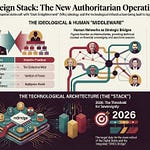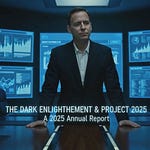Once a vocal critic of Donald Trump, JD Vance has now fully embraced the MAGA movement—revealing a deeper ideological shift driven by Silicon Valley power players and anti-democratic thought.
This text presents a stark contrast between JD Vance’s past statements about Donald Trump and his eventual acceptance of the Vice Presidential nomination. It suggests a significant shift in his political stance, moving from strong opposition—where he criticized Trump’s character, policies, and impact on the working class—to embracing a role as his running mate.
Key Observations:
Early Opposition to Trump:
Vance explicitly stated he was a “never Trump guy.”
He expressed a strong distaste for Trump, calling him “noxious” and harmful to the working class.
He suggested Trump was a type of “opioid” for his supporters, implying he was an addictive but destructive force.
He acknowledged that some of Trump’s support was rooted in racism and xenophobia.
He considered voting third-party or even writing in his dog rather than supporting Trump.
Dramatic Reversal:
The final line, “I officially accept your nomination to be Vice President of the United States of America,” highlights his eventual embrace of Trump and his movement.
The juxtaposition of these statements suggests either a profound change in belief or a politically strategic shift.
The Role of Key Influences:
Peter Thiel's Influence:
Vance’s political ascent is closely tied to venture capitalist Peter Thiel, who has backed him financially and ideologically.
Thiel has been a major proponent of anti-democratic, right-wing libertarianism, advocating for strongman-style governance over traditional democratic structures.
Elon Musk’s Role:
Musk has increasingly positioned himself within right-wing politics, both through public statements and financial support of Trump.
His alignment with Vance reflects the growing intersection between Silicon Valley elites and authoritarian-leaning conservatism.
Dark Enlightenment and Neo-Reactionary Thought:
The Dark Enlightenment, a movement influenced by Curtis Yarvin, rejects democracy and advocates for an elite-controlled government.
Vance has been associated with this ideology, aligning himself with figures who seek to dismantle democratic norms in favor of centralized power.
Implications:
The contrast between past and present statements could be seen as opportunistic, raising questions about political authenticity.
However, rather than a simple shift for political gain, Vance’s transformation may be part of a broader ideological realignment with tech billionaires and intellectual movements that challenge democratic governance.
It highlights the broader theme of realignment within the Republican Party, where former critics of Trump have become his allies.
It may serve as an attack or critique against Vance, showcasing inconsistency in his political ideology, but also suggesting a deliberate move toward authoritarian and techno-libertarian ideals.
Conclusion:
The structure of this passage—moving from strong condemnation to full acceptance—seems designed to underscore political hypocrisy or evolution, depending on the perspective. However, Vance’s shift does not exist in isolation but is deeply intertwined with a network of powerful figures who advocate for post-democratic governance. His embrace of Trump may not just be about ambition—it could signal a broader ideological shift toward a new form of elite-driven authoritarianism.










